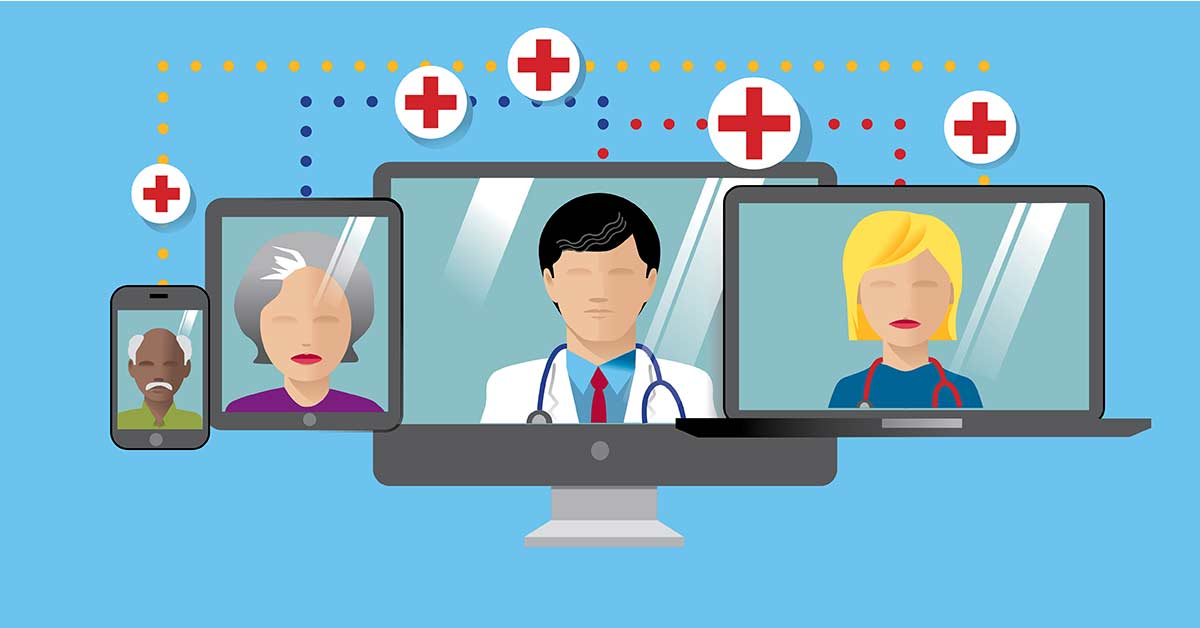
Frequently Asked Questions About Telehealth and Cancer Care
-
You may not have thought much about telehealth a few months ago, but use of virtual medicine has exploded during the COVID-19 pandemic. It allows patients, including those with cancer, to initiate and continue their treatment plans without having to attend in-person appointments. This maximizes social distancing and decreases risk for vulnerable individuals and their families.
Telehealth is expected to continue its upward trend, even when life eventually returns to normal. Below are some commonly asked questions about telehealth, along with answers that will help you understand how virtual visits work (specifically for cancer care):
Q: What is telehealth?
A: Telehealth (or telemedicine) is the use of electronic technology to provide patients with real-time care. When it’s not possible, or necessary, to attend a medical appointment in-person, you may be able to meet with your provider virtually (via video chat or a phone call).
Q: How can telehealth be used for cancer care?
A: Telehealth can play an important role in a patient’s cancer journey. In many cases, if you’re seeking an initial or a second opinion, an expert can review your scans and tests digitally and discuss your diagnosis via video or phone consultation.
Many cancer treatments themselves will still need to be administered in-person, but checkups in between treatments can often be done virtually (depending on the purpose of the visit). You can also use telehealth to meet with a genetic counselor, talk with your providers about managing medications and symptoms, or learn how to make healthy lifestyle changes.
In some cases, telehealth can even expand access to care. Virtual meetings can make it easier to meet with many different specialists on your team in a short time frame.
“Our patients often meet with a number of physicians with different specialties when they come to Fox Chase, and this can make for a very long day,” said Alexander Kutikov, MD, FACS, a urologic oncologist and Chair of the Telehealth Committee at Fox Chase Cancer Center. “With telehealth, a patient can quickly jump off one appointment and on to another.”
Telehealth might also allow you to learn about clinical trials that are being conducted far from your home, and you may also be able to use telehealth for follow-up visits after your treatment is over.
Q: Is telehealth a good fit for me?
A: Because telehealth can be used for so many different scenarios, there’s a good chance some of your appointments can happen virtually. Of course, when and how often you’re able to take advantage of telehealth depends on your individual diagnosis and treatment needs.
“For some appointments and disease processes, telehealth just isn’t possible,” Kutikov said. “A face-to-face visit and a physical exam may be required.”
Q: What is telehealth like at Fox Chase?
A: Fox Chase currently offers video or phone consultations, when appropriate. Your provider will determine the best type of appointment for you based on your diagnosis and what might be required at your visit.
Our video visits are easy and safe to login to. You only need a smartphone with a camera and a microphone to download and access our secure web application and attend your appointment.
If you run into trouble navigating the video platform or if you lack access to a device with a camera, you still have options.
“We can work with you to figure it out,” Kutikov said. “We can always default to a telephone visit if a patient can’t access the video platform.”
During this pandemic, we’ve had to take a number of precautions and evolve with how we deliver the best treatment possible to our patients. Telehealth has helped us continue to provide exceptional care in an uncertain time.
Learn more about telehealth at Fox Chase Cancer Center.
